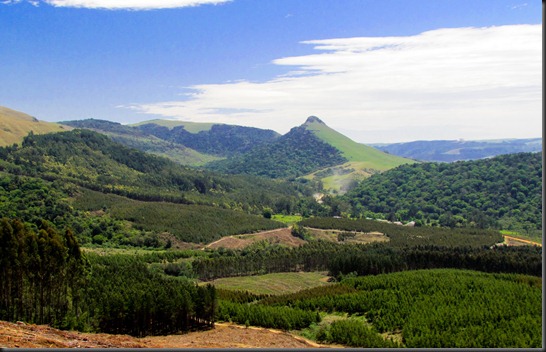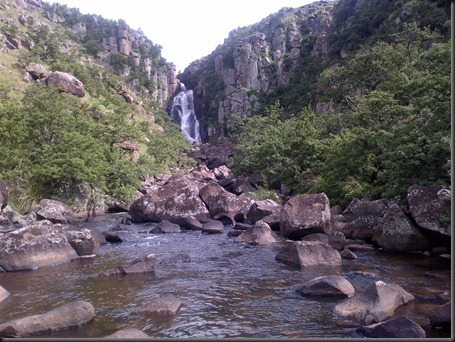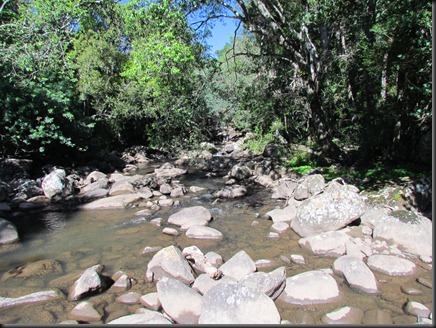A good few years back, my son and I accompanied my father and his brother on a Saturday sortie to inspect a farm in the midlands of Natal.
It was not just any farm this one. It was the farm of my roots in a way. It was the place where my father grew up.
Umgeni Poort is situated near the headwaters of the Umgeni river, in a tight little valley which stretches South East from the little known Mpumulwane mountain.

While I was born nearly twenty years after my father left the place, my great grandfather is buried there, and I feel a certain affinity to the place. As a student I took it upon myself to make the acquaintance of the German nuns who occupied the farm at the time, and as a result I fished the river there several times. Strolling about the property stirred feelings of rediscovery. Beneath its rolling pastures and overgrown hedgerows are crumbling stonework and iron artefacts that jog ones imagination. There is much that is decrepit and forlorn about the place. Uprooted trees lie across old walls and fenceposts as weathered as Stonehenge stand guard like long forgotten sentries.
The land is sadly overgrown with wattle trees and brambles, and the river banks are choked in places to the extent that they shield the water from the sun, in dark and gloomy tunnels.
On this damp Saturday morning we crossed the Poort stream at the entrance to the farm very slowly, casting our eyes up its course into the dark trees. The Poort is a happy little stream that joins the Umgeni from the West. It has its source up on the high plateau that is now Ivanhoe farm, and which also belonged to my Grandfather prior to 1948. It cuts a steep slice back into the escarpment, forming a valley that is hidden away and mysterious, due to its inaccessibility and the fact that it cannot be seen from any road or house in the area.

My father has told how the family would go up that valley to a spot on the northern slopes, where there was a sawing hole. This was in a patch of forest where they cut the odd grand yellowwood by hand for timber, in the days before that was considered a crime. They would picnic there and I imagine that Granddad would fish the Poort for trout. The sight from the road suggests that the stream is simply too overgrown to fish now.

Beyond the confluence of the streams there is a maze of watercourses in the meadow that beg exploration, and which came to life with my father’s explanation as to what this is all about. There is an old weir across the Umgeni, and from it there leads a deep stone lined furrow. Following its course it takes you across the pasture on a raised levee for fifty yards or so. Then the ground falls away into a deep chasm, filled with water. On closer inspection the axle of the waterwheel is visible in the stonework, and all comes to light. Literally in a sense, because this waterwheel was used to generate electricity! Dad tells of the summer nights when a storm in the headwaters would raise the water level, spinning the wheel out of control, and pushing heady voltage through the system, causing light bulbs in the house to pop like balloons at the fair! He spoke that morning of the run down to the river by moonlight to close off the water valve, and of the cupboard under the stairs stocked to the brim with spare globes. He seemed to come alive in the memories.
He took us through the front door of the crumbling house, and showed me where his father’s desk took pride of place before a window, looking out over the garden. Through the hall was a pantry the size of my living room, and the kitchen with its woodstove told tales of hearty stews on winter nights before a blazing fire. Leading from Dad’s old bedroom, was a narrow veranda, where the two boys were allowed to pull their beds out on hot summer nights, to sleep with the sounds of the African night.
Beneath the house was a cellar, cold and damp, which would probably still be keeping crisp apples and good wine, were it not for years of neglect.
Off to the side of the house were the terraced orchards and vegetable gardens, all built by hand by the Italian prisoners of war. Of course all is now under thick grass, and the fruit trees are no more, but father reminisced about how his mother took fright at the cruel pruning performed by the Italians. In the few years that followed the trees bore fruit like never before!
Below the house is a very old stone dairy, which was in use right up until the time of my student visits. Granddad, I am told, would make his way down from the house with his wicker creel and cane fly rod, and lean them against the stone wall. After he had attended to the milking of his few cows he would carry on down to the Umgeni, and catch a few trout for dinner, at the death of the day.
When I first started fly fishing properly, I was permitted to use one of my Grandfather’s old cane rods as well as some of the other tackle that hung in the passage in our house. Although Grandfather had died a few years back, my father had very seldom fished, and so I was using flies out of Granddad’s old Wheatley fly box. They were March Browns, Invictas, and Butchers. They were also probably the very flies he had cast in the upper Umgeni after milking.
We walked around the property, and surveyed the poor quality buildings of later years that now lay in unsightly ruins. There was wire and litter about the place. We walked up to my Great Grandfather’s grave. Although my Uncle has done a fine job of restoring the headstone, the spot is surrounded by ugly gum trees, with bare earth beneath them.
There is a wonderful old aerial photo of Umgeni Poort that hangs at Petrus Stroom. Knowing when it was taken I can only imaging that it was shot from a very old bi-plane that would have had to dive down into the valley to get a view like that. It is one of those black and white pictures that has had the colour added afterwards, such that the whole thing is sepia, and vaguely unreal. It portrays a particularly neat and tidy farm tucked between the hills. In it one can see an ox drawn plough in action, trees and hedges in neat rows, and orchards beyond an immaculate garden.
I think I prefer the memory of that picture more than what I saw that morning, but due to my having seen the farm in such contrasting condition, I am bound by a desire to one day own that land, and turn it into what it was.
3 Responses
I enjoyed this visit to your South African roots and hope that one day you’ll be able to give the place a new start!
Here’s hoping. In the meantime good news is that the WWF is launching a catchment improvement project in the area, and this very spot has been chosen for a big cleanup!